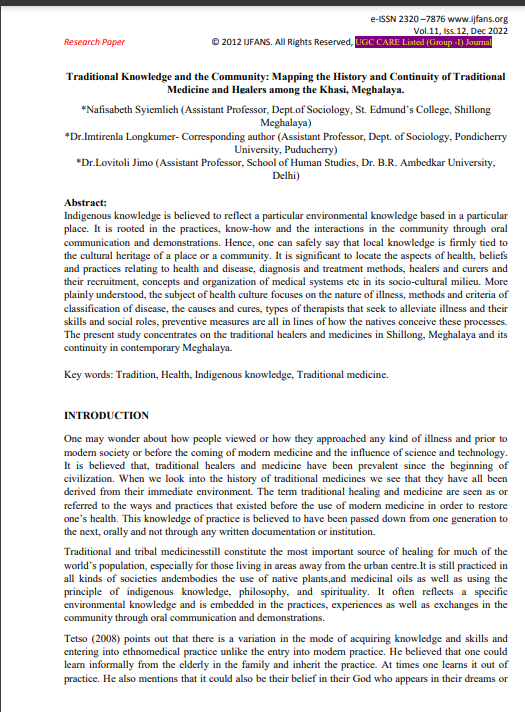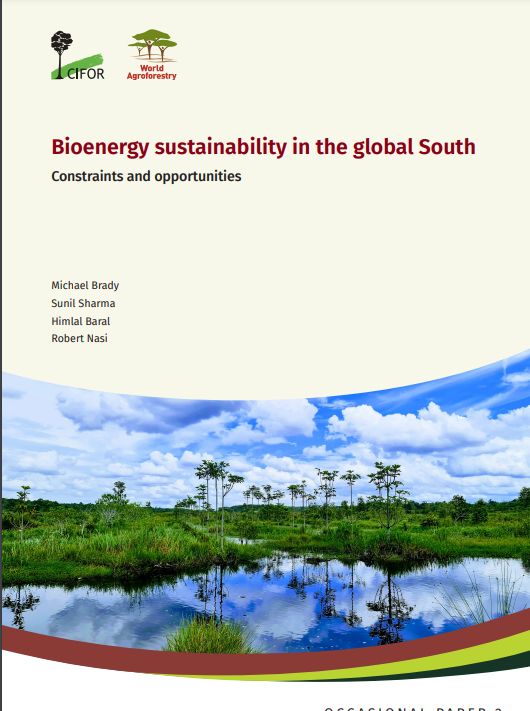Research Papers/Articles

Traditional Knowledge and the Community: Mapping the History and Continuity of Traditional Medicine and Healers among the Khasi, Meghalaya.
2021
Author(s): Syiemlieh N, Longkumer I, Jimo L
The present study concentrates on the traditional healers and medicines in Shillong, Meghalaya and its continuity in contemporary Meghalaya. Traditional and tribal medicines still constitute the most important source of healing for much of the world's population, especially for those living in areas away from the urban centre .It is still practiced in all kinds of societies and embodies the use of native plants, and medicinal oils as well as using the principle of indigenous knowledge, philosophy, and spirituality

Research on Indigenous People and the Role of Information and Communications Technology in Development: A Review of the Literature
2017
Author(s): Du JT
Multiple empirical methods were used for the investigation, including case studies and surveys. Indigenous cultural and knowledge preservation, Indigenous literacy and education development, Indigenous peopleâs interactions with technologies, and the digital divide issues were identified as four main research topics. On the basis of the review, future research directions from an information research perspective are discussed.
Local Agriâfood Products of Womenâs Cooperatives. The âfeminine sideâ of Quality
2010
Author(s): Anthopouloua T , Koutsou S
This paper examined the motives of consumers in buying local traditional food from rural womenâs cooperatives and their perceptions for âspecific qualityâ of womenâs foods with connotations of âa homemadeâ and so traditional, pure and healthy foodstuff. It also explore to what extent visitors to womenâs coâoperatives are influenced in their shopping by the fact that products are prepared by women.
Short Supply Chains For Local Food in Mountain Areas
2010
Author(s): Teahana BK, Kranisa CL,Inglisb C,Leata P, Gihaa CR
The paper aims to investigate factors responsible for the resilience and long term survival of short, local food supply networks formed in mountain areas characterised by low population density, remote location and underdeveloped infrastructure.

Understanding the Application and Use of Indigenous Research Methodologies in the Social Sciences by Indigenous and Non-Indigenous Scholars
2021
Author(s): Pidgeon M , Riley T
Research partnerships with Indigenous communities are relationships with cultural expectations of responsibility, relevance, and respect for Indigenous knowledge, goals, and aspirations. Indigenous communities have been seeking access to and ownership, control, and possession of research in their communities ever since âresearchersâ came to their lands (Brant Castellano, 2004; Wilson, 2008)

Labelling and certification schemes for Indigenous Peoplesâ foods : Generating income while protecting and promoting Indigenous Peoplesâ values
2022
Author(s): Food and Agriculture Organization of the United Nations
This review entitled âLabelling and certification schemes for Indigenous Peoplesâ foods: Generating income while protecting and promoting Indigenous Peoplesâ valuesâ provides an important building block in a much larger vision, which is to enable Indigenous Peoples to continue to be innovators of sustainable markets in favour of biodiversity and nutritional security.
Working With Informality: Constructive Ways To Transform Food Systems
2023
Author(s): Vorley B
This working paper explores the challenges involved in reversing decades of underinvestment, and why focusing too closely on formalisation may price out or remove informal food systems â and those who depend on them â from the market.

Bioenergy Sustainability in The Global South Constraints and Opportunities
2023
Author(s): Brady M, Sharma S,Baral H, Nas R
The study concludes that a global South bioenergy forum is needed to support dialogue, learning and cooperation and help ensure that the positive, transformative aspects of bioenergy are realised and deleterious ones avoided. An example of such a forum is the CIFOR-ICRAF Circular Bioeconomy Transformative Partnership Platform (https://www.cifor.org/cbe).
Youth Engagement in Land And Ecosystem Restoration
2021
Author(s): Kemeh SD, Kabalan AAM
This working paper presents a transformative vision of young peopleâs engagement in the restoration agenda at multiple scales.
Gender, Climate Change, and Resilient Food Systems
2017
Author(s): Nkengla-Asi L
This study aims to understand how men and women in Cameroonâs Southwest region differ in their vulnerability to and their coping strategies for climate change impacts.Understanding such gender differences could facilitate the development of gender-sensitive policies and programs and could help improve sustainable and more inclusive adaptation strategies.



